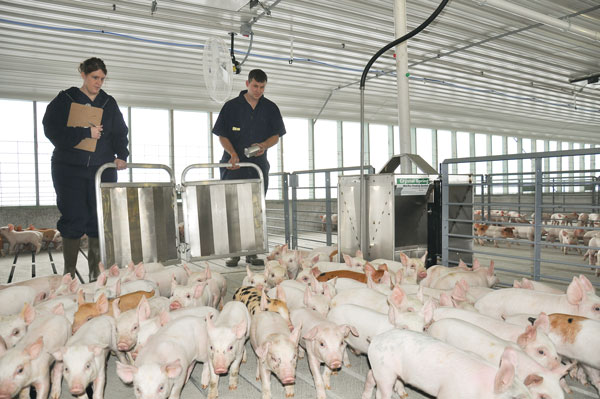Making animal well-being a priority
Iowa Select Farms is continuing to refine what animal care should be, and is embedding a philosophy of caring for animals throughout all facets of production.

Launched last summer at Iowa Select Farms, Iowa’s largest pork producer, SelectCare is about meeting the needs of individual pigs in the care of the company’s more than 1,000 employees and contractors.
To accomplish this key goal, the Iowa Falls-based company is continuing to refine what animal care should be, and is embedding a philosophy of caring for animals throughout all facets of production in the more than three dozen sow production sites and 500 wean-to-finish or grow-finish sites scattered across Iowa.
Leading the effort are the sow, nursery and finishing teams along with Howard Hill, DVM, director of Iowa Select’s animal well-being department.
“Ever since the inception of the company in 1993, our owner (Jeff Hansen) and management have had a desire to do the best we can as far as animal care and animal well-being,” Hill says. “But things have changed over time, expectations are different than they were five or 10 years ago and how we handle animals is different.”
“SelectCare is an enhancement to what we have been doing for a long, long time. Our entire production team is working on promoting a stronger culture of animal care,” adds P.J. Corns, director of sow production.
CEO Hansen has tasked employees with meeting three commitments: staying focused to provide the best animal care possible, welcoming the tools and resources to make the company better and adopting a continuous improvement mindset.
Employee development
In establishing SelectCare to make animal care more specific and focused, Hill and staff developed an animal well-being department and hired four full-time animal well-being specialists: Jeff DeWeese, Katie Tapper, Lane Ostendorf and Wendi Snider, who have varying levels of experience in pork production. All are Pork Quality Assurance-Plus advisers. Teamed up with the production group, a new employee orientation program was developed.
“The cornerstone of our production system has been built on coaching and training, so the step forward on a new employee orientation program is a logical one,” Corns says.
New employee orientation and training is a nine-day process, Snider says. “Traditionally, employees were brought in, hired, sent to the farm for training and brought back once a month for a one-day orientation. But now we hire weekly, and employees don’t actually go on the farm until they have gone through a one-day classroom orientation that covers everything from a company and industry overview and in-depth information on the National Pork Board’s We Care program, to SelectCare with a focus specifically on animal handling,” she says.
Once classroom orientation is completed, prospective employees are sent to farms for an intensive seven-day training schedule. At that time, the trainer takes the employee through everything from biosecurity and proper animal handling to how to perform production practices, such as castration and tail docking, Snider says.
“What’s important is that the trainer’s role and responsibility are well-defined and highly focused on only training the new employees. The trainer has no specific on-farm responsibility other than to train those people; the trainer is not a person who is on that farm for production purposes. This process standardizes how prospective employees are trained,” Corns emphasizes.
On Day 9 of training, employees return to the classroom to learn all aspects of the PQA-Plus program and to become certified, Snider says. Employees also take an animal well-being test. “These retention tests are designed to demonstrate that employees understand the animal handling PQA-Plus material they have been taught,” she says.
“We have emphasized specialized roles throughout our entire production system,” Corns says. “On-farm, targeted training allows our training staff the ability to identify where they think the new employee has the best fit. This has been an added benefit to make sure we have the right position for the person.”
Employee orientation
Employee orientation serves several functions. It equips those who work on farms with the needed tools and education to handle and manage animals and helps them understand the expectations of Iowa Select. It also carries a human resources component to improve training and employee retention, says Mike Faga, director of Human Resources.
Applicants may have experience on other livestock operations but not with hogs, so it’s good to explain novelties, such as shower-in, shower-out policies that are unique to hog operations. “The simple things we take for granted that we are required to do (like showering) are the things we need to focus on with new people to help engage and retain those people long-term,” he says.
To enhance the training of all of their employees, Iowa Select has changed PQA-Plus recertification to an annual basis; the NPB requires recertification every three years.
Employees are also required to take an annual retention test on various components of the animal well-being program.
On-farm audits
Iowa Select Farms’ internal audit was developed through the expertise of the animal well-being department in collaboration with the production and management teams. The on-site audits include a complete focus on the following.
Biosecurity protocols;
Animal movement procedures;
Body conditioning scoring;
Documentation and recordkeeping;
Employee training and documentation;
Standard operating procedures;
Storage of supplies and animal health products;
Facilities, flooring and equipment maintenance.
To assist with assessment of facilities, site auditors are equipped with high-quality, waterproof cameras that can capture images of issues that need to be corrected, Hill says. These cameras can be thoroughly disinfected between farms.
Once an audit is complete, the specialists share their findings with department managers for possible follow-up.
“We’re finding a lot of the changes revolve around tightening up documentation and making sure the correct paperwork is on the farm,” Hill observes. “The audits are also an opportunity to identify the needs for enhancements to our standard operating procedures, making sure they are in place, clearly stating how the job should be done and that our employees are trained on each and every competency.”
Hill notes the most important factors of the audit are to look at feed, water, ventilation and daily observation of each animal. “We want every animal in our system to have a set of eyes on them every day,” he says.
“I can honestly say we are making tangible improvements based on the feedback from the audits,” Corns says. “Audits spin into action plans, whether it is more training, clarifying our standard operating procedures or facility maintenance.”
Following proper procedures for euthanasia are also critical, DeWeese says.
“Three years ago, we moved away from using blunt force trauma, even though it is an approved method of euthanasia,” Hill says. “Done properly, it is probably one of the most efficient ways of rendering an animal insensible. But because the aesthetics are objectionable to some, we decided to use CO2 euthanasia (gas chamber) on all of our non-viable small pigs in farrowing and early nursery. For older pigs, a penetrating bolt gun is used.”
Third-party audits, expert advisory board
Iowa Select Farms has also incorporated third-party audits as part of their SelectCare program. They have used the auditing services of Validus Inc., a consulting and auditing firm based in Des Moines, Iowa.
Iowa Select Farms also has an expert animal well-being advisory committee. This committee consists of an animal ethicist, Candace Croney from Purdue University; a consulting veterinarian, Paul DuBois from Oklahoma; and an animal scientist/animal well-being expert, Anna Johnson from Iowa State University.
This expert advisory committee reviews internal farm audits of sow, nursery and finisher farms and conducts their own third-party audits. They also review standard operating procedures during their quarterly meetings.
Team effort
At Iowa Select Farms, auditing results are circulated to all of the different production departments and are reviewed by Hansen as well. “The transparency aspect is positive. We want to challenge ourselves, make improvements and work together as a team to push the limits on production and animal care,” Corns says.
That transparency also extends to Iowa Select’s harvest partner, JBS Swift, Hill says. For the last three years, marketing and sales representatives of the packing company have toured production facilities at Iowa Select Farms, accompanied by some of JBS’ customers from the retail, restaurant or meat sector.
“We call this program Pork University. We discuss how we care for our animals and run our business in a conference room setting, then give them a complete tour of a sow farm where we demonstrate all of these procedures. They also visit a wean-to-finish facility and learn about nutrient management,” Hill explains.
These visitors also take a tour of the Iowa State University Meats Lab under the direction of meat scientist Ken Prusa. The program ends with a day touring the JBS Swift plant in Marshalltown, Iowa.
To enhance transparency, Iowa Select is developing farm video tours for customers and prospective employees, and is creating dedicated web pages to share more information about SelectCare.
Productivity improves
There has been a dramatic upsurge in the number of viable animals that are shipped to slaughter using approved handling methods, Hill notes.
“We’ve made more than a 50% improvement in reducing injured or ‘slows’ going to market in the last few years by placing more focus on employee training. One example is recognizing when exhausted or fatigued pigs need to rest for an hour or so before they are sent to market,” he says.
The production staff led by Allen Whiley, in charge of nurseries and finishers, has implemented this training.
Iowa Select also relies on outside resources for expertise, such as the animal handling videos produced by Elanco Animal Health and work with ISU and the NPB.
A big improvement occurred when the philosophy of loading hogs shifted from moving too many animals down a hallway at a time to moving four to five animals at a time. “You can load faster and with less stress on the pigs and the employees. Hogs are not turning around on you,” Hill says.
“Loading of market hogs is also audited as part of the Transport Quality Assurance program followed at Iowa Select Farms,” he says. A two-person staff trains loading crews about proper handling of pigs.
Ingraining animal care
With SelectCare, Iowa Select Farms is ingraining animal care as part of the daily dialogue and culture of employees, Hill says.
For years, the company has strongly enforced a zero-tolerance policy for willful acts of abuse or neglect with regard to the animals on their farms, he emphasizes.
A toll-free Animal Care Hotline is in place, allowing employees and stakeholders to report any animal care concerns they may have.
“We’re focusing our energy and resources to implement SelectCare throughout our entire system all the way down to the slat level," Corns says. “This is not unlike how we approach, for example, achieving our production targets. We work with our trainers, farm managers, human resources – everyone – to use our SelectCare resources and expertise and continuously improve.”
About the Author(s)
You May Also Like





